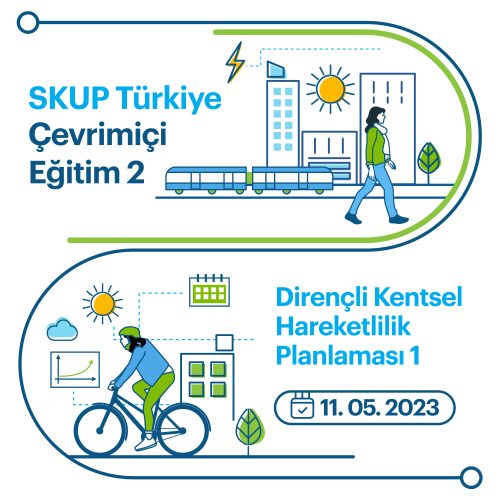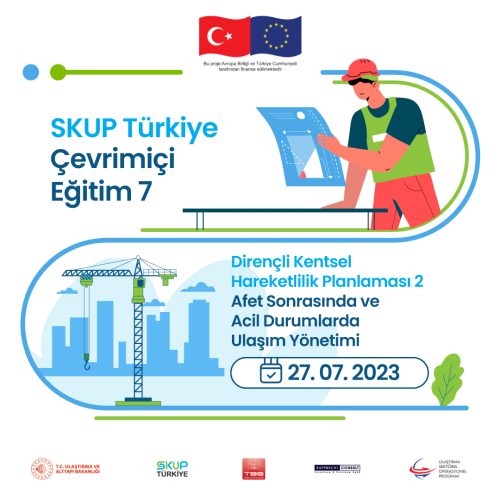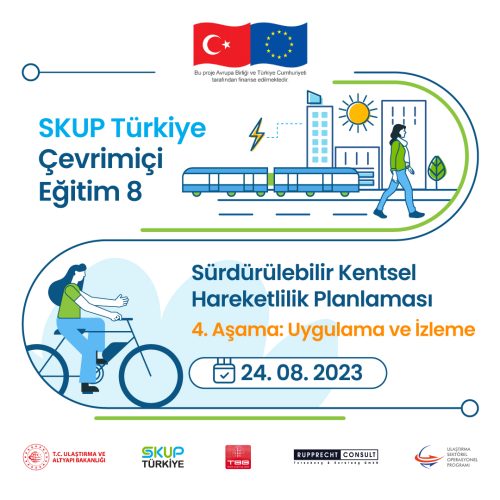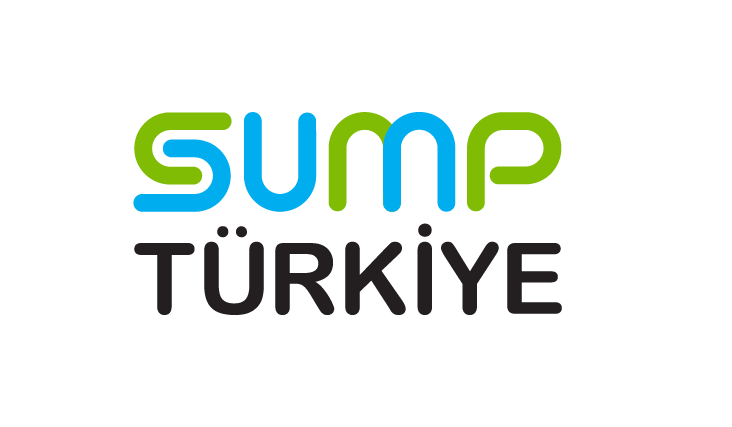The training programme developed within the scope of the SUMP Türkiye Project aims to strengthen the knowledge and skills of municipalities and relevant institutions in the fields of sustainable urban mobility and transport planning. It also seeks to foster inter-institutional cooperation and encourage the exchange of experiences.
Launched in April 2023, the programme will run throughout the project duration and includes a total of 8 in-person and 36 online training sessions over a period of 2.5 years.
Our online trainings provide participants with the essential knowledge and methodologies for implementing, monitoring, and improving sustainable urban mobility planning at local, regional, and national levels.
Designed with a global perspective, the training sessions cover up-to-date technical topics relevant to SUMP implementation and offer access to national and international best practices, presented and discussed by our experts.
Webinars
WEBINAR 1:
Core Elements of Sustainable Urban Mobility

Our first online training session, held on April 27, 2023, introduced the core concepts of sustainable urban mobility and Sustainable Urban Mobility Planning (SUMP). The session covered urban transport and mobility challenges, the significance of SUMP, and sustainability principles in depth. Participants gained insight into how SUMPs can be integrated into urban transport planning processes. In addition, best practices from leading cities in the region and the EU were shared to guide local authorities and raise awareness.
WEBINAR 2:
Resilient Urban Mobility Planning – Part 1

The second training, held on May 11, 2023, focused on building stronger and more resilient urban transport systems to withstand potential risks and crises. With national and international experts, the session explored methods for planning, implementing, and managing resilient and sustainable urban transport systems.
📚 Topics covered:
- Planning for more resilient urban mobility: Principles and strategies to enhance the resilience of urban mobility systems.
- Managing urban systems to enhance resilience: Governance approaches for strengthening transport systems against disasters and crises.
- Key concepts and principles of resilience in urban mobility: Understanding and enhancing resilience in cities.
- Zagreb Historic Urban Area Restoration Programme: Restoration strategies and their role in increasing post-disaster resilience through urban planning.
The session included interactive participation through Mentimeter and showcased international case studies and best practices.
WEBINAR 3:
Sustainable Urban Mobility Planning
Phase 1: Preparation and Analysis

Held on May 25, 2023, this training focused on the first phase of the SUMP process: Preparation and Analysis. Key issues such as funding, governance, stakeholder engagement, and data collection were addressed with examples of best practices.
📚 Topics covered:
- Technical and financial support for local authorities: Mechanisms for obtaining support in SUMP processes.
- Getting started with urban mobility planning: Key analyses and steps at the beginning of SUMP.
- Governance, institutional structuring, and cooperation in SUMP: The importance of coordination and collaboration among institutions.
- Communication and marketing in the SUMP process – e-smartec Interreg Europe project: The role of public engagement.
- Case Studies: Data collection and analysis / Public participation in SUMPs.
- Data requirements and analysis for SUMP: Importance of proper data collection and analysis.
Interactive participation was encouraged through Mentimeter, supported by best practices and success stories.
WEBINAR 4:
Sustainable Urban Mobility Planning
Phase 2: Strategy Development

This session, held on June 7, 2023, focused on the second phase of SUMP—Strategy Development. The goal was to provide strategic direction through stakeholder engagement, vision setting, scenario development, and performance indicators.
📚 Topics covered:
- Vision, scenario development, and performance indicators in SUMP.
- Integration of national mobility and environmental targets in Türkiye.
- MORE project – Future scenarios for feeder roads of the Trans-European Network.
- SUMP scenarios and measures: Planning alternative futures.
- Understanding SUMP indicators and how to apply them.
- Case Study – Konya SUMP: Implementation insights.
- Case Study – Eskişehir SUMP: Achievements and process.
- Case Study – Mobility 2050 in Brussels: Long-term visioning and guidance.
Participation was interactive and supported with international case studies and tools.
WEBINAR 5:
EUROPEAN MOBILITY WEEK
Purpose, Registration Process, and Best Practices

This session highlighted the purpose, preparation, and implementation of European Mobility Week (EMW) activities, focusing on how to plan and deliver impactful local events.
📚 Topics covered:
- Overview of EMW: Campaign goals, tools, timeline, and registration.
- National-level coordination of EMW.
- Best Practices: Context, process, measured outcomes, and next steps (e.g., 2022 Mobility Action Award winner Metropolia GZM – Poland).
- 2023 EMW Theme – “Save Energy.”
- Best Practices: Konya Metropolitan Municipality’s EMW activities.
Participants were presented with inspiring best practices and planning tips.
WEBINAR 6:
Sustainable Urban Mobility Planning
Phase 3: Measure Planning

The sixth online training session focused on the third phase of the SUMP process: Measure Planning. This phase concentrates on the selection of measure packages, definition of actions, and assignment of responsibilities.
📚 Topics covered:
- Introduction to SUMP Phase 3: Selecting measure packages, defining actions and responsibilities
- Energy efficiency in public transport infrastructure in Central Europe – EfficienCE EU Project
- Urban Vehicle Access Regulations (UVAR) in Europe – ReVeAL EU Project
- Active travel strategies in Edinburgh – Walking and cycling measures
- Kadıköy Municipality implementation
- Istanbul Sustainable Urban Mobility Plan (SUMP) and best practices
- Innovations in mobility and transport from Madrid
Throughout the session, participants were guided with case studies supported by successful strategies and experiences from various cities and projects.
WEBINAR 7:
Resilient Urban Mobility Planning – Part 2:
Post-Disaster and Emergency Transport Management

The seventh session explored transport management in the aftermath of disasters and emergencies. Closely linked to Phase 2 of the SUMP process (Strategy Development), it focused on vision building, scenario planning, and target setting.
📚 Topics covered:
- SUMP Topic Guide: Planning for more resilient urban mobility and transport systems in crisis situations
- Resilient, Smart, and Sustainable (RSS) Cities – Transport approaches
- Experiences from the University of Zagreb Faculty of Transport and Traffic Sciences
The session featured successful case studies and methods for building more resilient transport systems against future risks.
WEBINAR 8:
Sustainable Urban Mobility Planning
Phase 4: Implementation and Monitoring

This session introduced the fourth and final phase of SUMP: Implementation and Monitoring. This phase focuses on the execution of selected measures and actions through systematic monitoring, evaluation, and communication. It addressed key questions such as:
🎯 How can we manage effectively?
🎯 How are we implementing actions?
🎯 What have we learned?
📚 Topics covered:
- Introduction to Phase 4: Implementation of measures and actions, accompanied by monitoring, evaluation, and communication
- SUNRISE – Sustainable Neighborhood Mobility: Local-level implementation of SUMP actions in Europe
- Istanbul SUMP: Implementation experience
- Euroclima+ – SUMP development and implementation in Latin America: lessons learned
- EUROPEAN MOBILITY WEEK – 2023 EMW Thematic Guidelines “Save Energy” and potential project ideas
- Promotion of EMW campaigns and activities
This session provided comprehensive information on the implementation and monitoring phase of SUMP, supported by good practices and effective management strategies.
Online Training 8 Registrations
Education Presentations:
WEBINAR 9:
Institutional Structure and Governance for SUMP Development

The ninth online training session addressed the institutional and governance structures required for effective SUMP development and implementation. The session emphasized the importance of inter-institutional cooperation and governance mechanisms and shared best practices from European cities.
📚 Topics covered:
- Importance of institutional cooperation and governance frameworks
- Institutional and governance examples from European cities
- Best practices in inter-institutional collaboration
The session provided detailed insights into how to establish effective governance and institutional structures to successfully implement SUMPs.
Online Training 9 Registrations
Education Presentations:
WEBINAR 10:
Traffic Congestion and Air Quality – Part 1

This session focused on traffic congestion and air pollution in cities and the challenges municipalities face in addressing these issues.
📚 Topics covered:
- Challenges related to urban traffic congestion and air pollution
- Evaluation of effective solutions tailored to local urban contexts
- Discussion of successful strategies and their adaptability to other cities
- Guidance on steps and policies required to develop sustainable transport solutions
Online Training 10 Registrations
Education Presentations:
WEBINAR 11:
Traffic Congestion and Air Quality – Part 2

This follow-up session continued the discussion on traffic congestion and air quality in urban environments, emphasizing their interlinkage with environmental concerns.
📚 Topics covered:
- In-depth discussion of the environmental impacts of congestion
- Insights on current urban conditions and transport-related environmental outcomes
- Fostering dialogue and generating solution-oriented approaches
- Exploration of innovative strategies for reducing congestion and improving air quality
Online Training 11 Registrations
Education Presentations:
WEBINAR 12:
Road Safety – Part 1

The first part of the Road Safety session addressed one of the most pressing urban issues – traffic safety.
📚 Topics covered:
- Comprehensive approach to understanding causes and impacts of traffic safety issues
- How infrastructure, incentives, policies, and behavioral change must be integrated for effective road safety solutions
Online Training 12 Registrations
Education Presentations:
WEBINAR 13:
Road Safety – Part 2

This session continued the discussion on road safety by examining best practices and methodologies.
📚 Topics covered:
- Best practices and lessons learned from selected cities
- Methodologies and approaches used to promote road safety, along with participant reflections
Online Training 13 Registrations
Education Presentations:
WEBINAR 14:
Resilient Urban Mobility Planning – Part 3

The 14th online session offered key insights into resilience in urban planning and mobility, supported by international case studies.
📚 Topics covered:
- Regulation of vehicle access in smart and resilient cities
- Intersections of sustainable urban mobility systems
- The role of Intelligent Transport Systems (ITS) in planning
- Active mobility planning for network-level urban resilience
- Triple Access Planning for uncertain future scenarios
Online Training 14 Registrations
Education Presentations:
WEBINAR 15:
EUROPEAN MOBILITY WEEK: Purpose, Registration Process, and Best Practices

The 15th online training of SUMP Türkiye focused on the 2024 EUROPEAN MOBILITY WEEK (EMW) theme: Shared Public Spaces. Designed as an informative and interactive session with broad municipal participation, the training addressed effective communication strategies for planning and implementing sustainable mobility campaigns and guidance on participating in EMW.
📚 Topics covered:
- Introduction to the EMW campaign, registration procedures, and the 2024 theme
- Local campaigns and best practice examples aligned with the theme
- Effective use of social media, digital tools, and communication materials
- Award-winning practices and successful EMW initiatives from Türkiye
- Interactive exchange of ideas based on the experiences and questions of participating municipalities
The training aimed to support municipalities in developing more visible, impactful, and mobility-focused campaigns for EMW 2024.
Online Training 15 Registrations
Education Presentations:
WEBINAR 16:
Intelligent Transport Systems (ITS) and Big Data in Sustainable Urban Mobility Planning – Part 1

The 16th online training introduced Intelligent Transport Systems (ITS) and data use in mobility planning. Designed especially for municipalities with limited experience in transport-related technologies, the session explored how ITS can support road-based mobility and effective policy implementation.
📚 Topics covered:
- Understanding the concept of ITS
- How technology supports SUMP objectives
- Examples of street-level infrastructure types
- Basic traffic management techniques to improve road efficiency
Online Training 16 Registrations
Education Presentations:
WEBINAR 17:
Intelligent Transport Systems (ITS) and Big Data in Sustainable Urban Mobility Planning – Part 2

In continuation of the previous session, this training focused on advanced ITS strategies and how to further improve road-based mobility through data-driven technologies.
📚 Topics covered:
- Use of advanced ITS technologies to meet sustainable mobility goals
- How these technologies contribute to more integrated and effective traffic management strategies
Online Training 17 Registrations
Education Presentations:
WEBINAR 18:
The Importance of Walking and Developing Pedestrian Strategies

This session focused on the role of walking in sustainable mobility and strategies for creating more walkable, livable, and resilient cities.
📚 Topics covered:
- The critical role of walking in sustainable urban mobility and how to develop effective walking strategies
- Integrating walking with other urban elements to enhance livability
Online Training 18 Registrations
Education Presentations:
WEBINAR 19:
Intelligent Transport Systems and Data in Sustainable Urban Mobility Planning – Part 3

The 19th training explored how technology can enhance the efficiency and reliability of public transport systems and improve service delivery.
📚 Topics covered:
- How technology improves the operation and reliability of public transport
- Key emerging technologies supporting public transport systems
Online Training 19 Registrations
Education Presentations:
WEBINAR 20:
Cycling for an Active and Resilient Society

Held on August 1, 2024, this training focused on the role of cycling in building active and resilient communities. Moderated by architect and urban planner Adrian Puntes.
📚 Topics covered:
- Benefits of cycling in terms of health, environment, and economy
- Basics of safe cycling and traffic rules
- Key infrastructure elements in urban planning
- Strategies and awareness campaigns to promote cycling
- International success stories (e.g., Netherlands, Denmark)
Participants engaged interactively via Mentimeter, supported by global case studies.
Online Training 20 Registrations
Education Presentations:
WEBINAR 21:
Urban Vehicle Access Regulations (UVAR) and Accessibility – Part 1

This session hosted 139 participants and was moderated by Urban Mobility Expert Bonnie Fenton.
📚 Topics covered:
- Impacts of UVARs on traffic, environment, and quality of life
- Scope of the ReVeAL project and practices in six pilot cities
- Complementary measures and economic/spatial arrangements
- Functioning of low and zero-emission zones with city examples
- London’s Ultra Low Emission Zone: goals and impacts
Online Training 21 Registrations
Education Presentations:
WEBINAR 22:
Urban Vehicle Access Regulations (UVAR) and Accessibility – Part 2

Moderated by Bonnie Fenton, this session explored the practical implementation of UVARs and how they contribute to sustainable transport.
📚 Topics covered:
- Area-based and pricing measures to reduce congestion
- Contributions of spatial interventions to quality of life
- Importance of participatory governance models
- International examples: Vitoria-Gasteiz, Singapore, London
- Pricing models and future directions for UVARs
The session featured interactive discussions and concluded with forward-looking strategies for more livable cities.
Online Training 22 Registrations
Education Presentations:
WEBINAR 23:
Sustainable Urban Logistics

Held on October 10, 2024, this session welcomed 310 participants and was moderated by Leventcan Er from Rupprecht Consult.
📚 Topics covered:
-Social and environmental impacts of urban freight transport
-Policy recommendations from the White Policy Paper on urban logistics
-Flexibility, resilience, and stakeholder engagement in dynamic logistics
–Differences between logistics and freight transport; examples: Rotterdam, Kemalpaşa Logistics Center
-International solutions and approaches in sustainable urban logistics
🔍 Highlighted Speakers and Topics:
-Pedro Gomes: Inefficiencies in urban freight vehicles and e-commerce impacts
-Dr. Volkan Recai Çetin: Core areas and solutions in the White Policy Paper
-Katy Huaylla: Integration of logistics with mobility and environment departments
-Ioanna Kourounioti: Urban logistics vs. freight transport; good practices
-Prof. Dr. Mehmet Tanyaş: Urban logistics’ role in sustainability and planning
-Serkan Uçar: Kemalpaşa Logistics Center infrastructure
-Hassan Hussin: Sustainable logistics strategies in the Mediterranean region
Online Training 23 Registrations
Education Presentations:
WEBINAR 24:
Public Transport Planning

Held on October 30, 2024, with 151 participants and moderated by Seçil Kocatepe (Deputy Team Leader, SUMP Türkiye).
📚 Topics covered:
- Public transport and sustainable urban planning
- Integration of public transport into the overall SUMP process
- Key factors and challenges in designing attractive transit systems
- Public transport modes and criteria for mode selection
- Governance trends and innovations in public transport
- Integration of micromobility with transit systems
- Role of mobility hubs and MaaS (Mobility-as-a-Service)
Online Training 24 Registrations
Education Presentations:
WEBINAR 25:
Integrated Public Transport Planning – Insights from Europe and Beyond

The 25th session, held on November 27, 2024, hosted 1,391 participants and was moderated by Laura López (Deputy Team Leader, SUMP Türkiye).
📚 Topics covered:
- Planning mobility hubs and principles of inclusivity
- Climate-friendly transport design and its contribution to social well-being
- Accessibility and equity in public transport
- Integrating land use strategies with urban mobility
- Role of public transport in empowering communities
Online Training 25 Registrations
Education Presentations:
WEBINAR 26:
Public Transport Planning: Modes, Demand Forecasting, Financing, and Stakeholder Engagement

The 26th online training focused on public transport planning, including system types, demand forecasting methods, financing tools, and stakeholder participation. The session featured insights from Prof. Dr. Ela Babalık Hamitoğlu, Erhan Öncü, Orhan Demir, Assoc. Prof. Dr. Cem Kırlangıçoğlu, and Dr. Volkan Recai Çetin.
📚 Topics covered:
– Stakeholder and citizen engagement in public transport planning
– Demand forecasting techniques and data-driven decision making
– Comparative analysis of transport modes
– Route planning and GIS-based design
– Funding and financing alternatives for public transport investments
Online Training 26 Registrations
Education Presentations:
WEBINAR 27:
Data Collection for Sustainable Urban Mobility and Modelling

This session brought together experts and practitioners to explore data collection for sustainable urban mobility and transport modelling. Topics included traditional and innovative methods, digitalisation, and data needs for modelling.
Online Training 27 Registrations
Education Presentations:
WEBINAR 28:
Transport Modelling

The 28th session focused on types of modelling by planning level and data integration techniques. The session combined theoretical knowledge with real-life applications, supported by experienced professionals.
Online Training 28 Registrations
Education Presentations:
WEBINAR 29:
Mobility as a Service (MaaS): Foundations of Seamless and Integrated Urban Mobility Systems

This session hosted national and international experts to explore MaaS frameworks and implementation strategies enriched with best practices.
Online Training 29 Registrations
Education Presentations:
WEBINAR 30:
Mobility as a Service (MaaS): Strategies for Sustainable and Inclusive Mobility

Focusing on a comprehensive MaaS vision, this session explored digitalisation, data, payment systems, and accessibility.
Online Training 30 Registrations
Education Presentations:
WEBINAR 31:
Green Financing

This session aimed to support municipalities in exploring alternative financing sources for sustainable mobility projects by reviewing successful national and international green financing models.
Online Training 31 Registrations
Education Presentations:
WEBINAR 32:
Green Bonds – Part 1

This foundational session introduced green bond financing for transport projects, aiming to increase municipalities’ knowledge of sustainable finance instruments.
Online Training 32 Registrations
Education Presentations:
WEBINAR 33:
Green Bonds and Other Green Finance Mechanisms

This session provided an in-depth look at innovative green finance instruments to support sustainable urban transport.
Online Training 33 Registrations
Education Presentations:
WEBINAR 34:
Efficient Bus Planning for Local Authorities

This technical session supported municipalities in improving strategic planning for bus routes and schedules. It also covered BRT systems, terminal design, and enhancing user experience.
Online Training 34 Registrations
Education Presentations:
WEBINAR 35:
Parking Management and European Mobility Week (EMW)

This session supported municipalities in developing sustainable parking policies and communication strategies aligned with the 2025 EMW theme.
Online Training 35 Registrations
Education Presentations:



